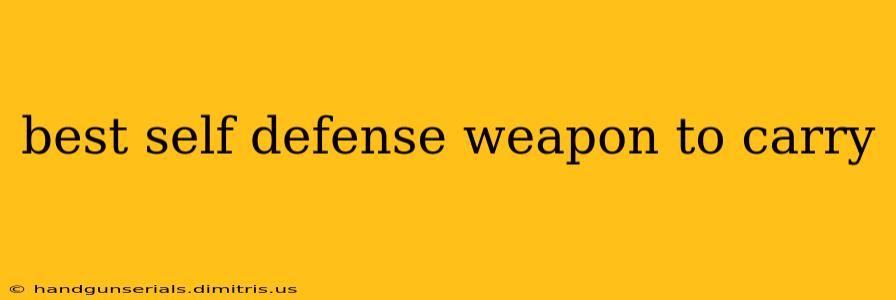Choosing the right self-defense weapon is a deeply personal decision, heavily influenced by individual circumstances, legal restrictions, and comfort levels. There's no single "best" weapon, as effectiveness depends on factors like training, situational awareness, and the specific threat encountered. This guide explores various options, highlighting their pros and cons to help you make an informed choice. Remember: Always prioritize legal compliance and responsible weapon ownership. This information is for educational purposes only and does not constitute legal advice. Consult with legal professionals and relevant authorities in your jurisdiction before acquiring or carrying any self-defense weapon.
Legal Considerations: The Foundation of Safe Self-Defense
Before considering any weapon, understand the laws in your area regarding self-defense and carrying weapons. Regulations vary dramatically by location, encompassing permit requirements, restrictions on weapon types, and justifiable use stipulations. Ignorance of the law is not a defense, so thorough research is paramount.
Weapon Types and Their Suitability
Several options exist for personal self-defense, each with its advantages and disadvantages:
1. Pepper Spray: Non-Lethal, Wide Reach
- Pros: Relatively easy to obtain and use, effective at temporarily incapacitating an attacker from a distance, generally legal in most areas (with restrictions).
- Cons: Ineffective against determined attackers, wind conditions can affect accuracy, requires direct contact with the attacker's face or eyes for optimal effect, may cause accidental injury to bystanders or the user.
2. Personal Alarms: Loud and Attention-Grabbing
- Pros: Simple to use, extremely loud, can attract attention and deter attackers, relatively inexpensive.
- Cons: Only effective at deterring an attack, not neutralizing an attacker, requires a clear line of sight to the attacker, might not be effective in noisy environments.
3. Kubotan/Yawara Stick: Small, Discreet, and Versatile
- Pros: Easily concealed, can be used for striking vulnerable points, provides a degree of leverage against stronger attackers.
- Cons: Requires training to use effectively, limited range, can be easily disarmed by a skilled attacker.
4. Tactical Pen: Discreet and Multi-Functional
- Pros: Easily concealed, can be used for writing, provides a striking tool capable of causing blunt force trauma.
- Cons: Limited range, requires training to use effectively, minimal stopping power, can break easily.
5. Firearms: High Stopping Power, Requires Extensive Training
- Pros: High stopping power, can defend against multiple attackers.
- Cons: Requires extensive training, legal restrictions are stringent, potential for serious injury or fatality, responsible gun ownership necessitates ongoing commitment to safety protocols and legal compliance. The misuse of a firearm can have severe legal repercussions.
Choosing the Right Weapon for You: A Personal Assessment
The best self-defense weapon is one you are comfortable and proficient with. Consider:
- Your Physical Capabilities: Are you physically strong enough to effectively wield a particular weapon?
- Your Training Level: Have you received adequate training in the safe and effective use of a chosen weapon?
- Your Legal Environment: Are you legally permitted to carry the weapon in your area?
- Your Comfort Level: Do you feel confident and capable of using the weapon in a self-defense situation?
- Your Lifestyle: Will the weapon be easily concealed and accessible in your daily routine?
Beyond the Weapon: Situational Awareness and Self-Defense Training
No weapon is a guarantee of safety. Proactive measures, such as situational awareness, avoiding dangerous situations, and personal safety training, are crucial complements to any self-defense tool. Learning self-defense techniques—regardless of whether you carry a weapon—is invaluable for enhancing your ability to protect yourself.
Disclaimer: This information is for educational purposes only. Always consult with legal and self-defense professionals before making any decisions regarding self-defense weapons. The use of any weapon carries significant risk, and responsible ownership is paramount.

